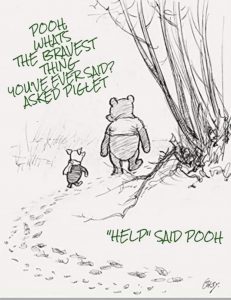The adage of “If you want something done right, do it yourself,” was ingrained in me at an early age. Until recently, I have always thought that being confident, capable and successful meant never asking for help. I used to think that asking for help meant that you were weak. I now think that asking for help is incredibly brave. My 17 year old son recently told me about a group chat with his workmates. Someone at work had sent an urgent message to the group asking how to do something while closing up the restaurant. Many of the coworkers poked fun at the lack of knowledge of the person seeking help. My son (brace yourself for this proud Mama Bear moment) texted that it was really brave of his co-worker to ask for help and provided the information that the coworker needed to close up for the night. I think that his act demonstrated wisdom an empathy far beyond his years.
Have you ever felt a little territorial or protective about your ideas or lessons in your classroom? I imagine everyone likes to be valued for their unique talents and abilities. In general, I don’t think anyone likes to be seen to be struggling and consequently, some teachers might choose to work in isolation. Perhaps it is fear. I’ve spoken to many colleagues who have identified as suffering from imposter syndrome. Perhaps those of us who have experienced imposter syndrome think that if anyone else got eyes on what we do every day that we would be judged and found to be lacking in some way. Often teachers will tell me that they don’t have time to share with their colleagues-there just isn’t enough time in the day to collaborate. With the busy pace of education, I know that I have absolutely felt that way. My experience has been that when I take the time to collaborate with others I in fact, have more time and consequently better programming. It is a concerted effort and takes a trusting relationship to co-plan and co-teach but when it works, it is amazing.
In my role as an instructional leadership consultant I am responsible for two portfolios; Innovation and Technology and the New Teacher Induction Program. At the beginning of the COVID pandemic as teachers were teaching virtually for the first time, some had never used things like Google apps, FlipGrid and Kahoot. I was doing my best to support teachers with tools for teaching online. Thankfully, I knew some other teachers that I could reach out to and ask for help. These teachers, close to the beginning of their careers, were using these tools in the classroom and were able to help design and present webinars to other more seasoned colleagues. As teachers, we often think that we need to have all of the answers for our students and with one another. I’ve heard it referred to as the “Sage on the Stage Syndrome.” We seem to feel that we need to stay ahead of everything, which is impossible. Education is changing more rapidly than ever. I learned so much from my colleagues over the months that we worked together as a team and even though it was stressful at times, it was also incredibly fun. I look back now on the powerful outreach our work had and the gratitude that was expressed by our colleagues and I am so glad that I got over myself and asked for help.
In the t.v. drama “New Amsterdam” whenever the new director of the hospital is introduced to someone, the first question that he asks is, “How can I help?” It happens in the first episode about twenty times. This was a BIG a-ha moment for me. What a powerful question! How often have we wanted our students to ask for help? How often have they refused when we have asked “Can I help you?”or “Do you need help?” Unfortunately, asking for help is still seen as a weakness by many people. However the question “How can I help?” turns it around so that the responsibility and focus is on the person offering assistance. It is more difficult for someone to just say “No.” to this question. It can help to create psychological safety in order to focus on what can be done to help rather than someone sitting in discomfort or shame because they won’t ask for help. Sometimes just asking can make all the difference to someone when they are feeling overwhelmed, even if they decline the offer. The four small words, “How can I help?” can make a powerful impact. Sometimes, asking for help is the bravest thing you can do.


Hi Michelle,
I love this post! Language is so powerful.
“Do you need help?” vs. “How can I help?”
I too had an a-ha moment like this when I realized the important difference between these two questions.
“Do you need help?” was almost an instant reflex of a question for me to ask my students. Until someone once asked me personally one day “How can I help?”. I couldn’t believe how safe this made me feel. I did not have to admit I needed help but instead help was being offered. “Psychological safety” is a great way to put it!
Thank you,
Melissa